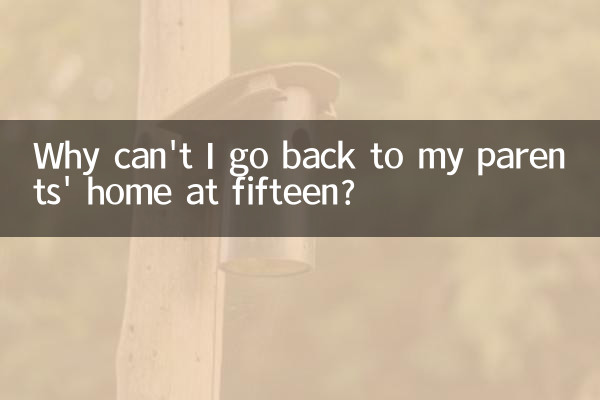Why can't I go back to my parents' home at fifteen?
In traditional Chinese culture, there are many customs and taboos about festivals, among which "you cannot return to your parents' home on the 15th day of the lunar month" is a widely circulated saying. This custom has different interpretations in different regions, but the core is related to family harmony and marital relations. This article will combine the hot topics and hot content on the Internet in the past 10 days to analyze the origin, regional differences and modern people’s views of this custom.
1. Origin and explanation of customs

"You cannot return to your parents' home on the 15th day of the lunar month" mainly refers to the 15th day of the first lunar month (Lantern Festival) or the 15th day of August (Mid-Autumn Festival). Married women should not go back to their parents' home to celebrate the festival. Here are some common explanations:
| Interpretation type | Specific content |
|---|---|
| traditional family concepts | It is believed that after a daughter gets married, she should focus on her husband's family, and returning to her natal family during festivals will distract from the "spirit of unity" of her husband's family. |
| Taboos and superstitions | In some areas, it is believed that fifteen visits to one’s mother’s family will “take away one’s family’s wealth” or “affect the brothers’ fortunes.” |
| holiday symbolism | The Lantern Festival and Mid-Autumn Festival symbolize reunion, and daughters should participate in sacrifices or family activities at their husband's house. |
2. Hotly discussed opinions and data across the Internet
By analyzing discussions on social platforms in the past 10 days, we found that this custom is quite controversial. The following are some statistics:
| platform | Proportion of support for traditional customs | Proportion of objections or doubts | Proportion of neutral discussions |
|---|---|---|---|
| 32% | 58% | 10% | |
| Douyin | 41% | 45% | 14% |
| Zhihu | 18% | 72% | 10% |
3. Changes in attitudes in modern society
With the development of society, the rationality of this custom has been questioned by more and more people:
1.Increased awareness of female independence: Many young people believe that the choice to return to their natal family should depend on personal wishes rather than traditional constraints.
2.changes in family structure: After the one-child policy, many families only have daughters. The rigid rule may cause the elderly to be lonely during holidays.
3.Regional differences fade: Increased population mobility has led to the gradual integration of customs in different regions, and the reduction of strict compliance with old rules.
4. Views of experts and cultural researchers
Some scholars put forward:
| point of view | representative figure | core argument |
|---|---|---|
| keep customs | Folklorist Wang | "Customs are cultural carriers and can be continued through improvement rather than total denial." |
| Get rid of bad habits | Sociologist Li | “Sexist stereotypes should be eliminated” |
5. How to balance tradition and modernity
In response to this dispute, the following methods are recommended:
1.Respect multiple choices: Family members decide through consultation and do not insist on unification.
2.Innovative holiday formats: For example, two families merge to celebrate or take turns celebrating the festival.
3.Focus on the emotional nature: The core of the festival is family connection, not formal restraint.
To sum up, the custom of "not being able to return to your parents' home during the fifteenth year" reflects the family concept of a specific historical period, but in contemporary society it needs to be flexibly adjusted according to the actual situation. The vitality of culture lies in adaptation and development, rather than in perseverance.

check the details

check the details